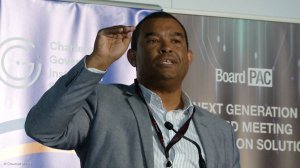The Presidency insists that progress is being made to implement the plan outlined by President Cyril Ramaphosa on July 25 to tackle load-shedding, which breached 4 100 GWh by the end of September – a level that is materially worse than the 1 776 GWh shed in 2021, the country’s previous worst load-shedding year.
However, The Presidency’s Rudi Dicks cautions that rotational power cuts are likely to remain a reality for at least another 18 months.
In a presentation delivered during the Chartered Governance Institute of Southern Africa’s recent conference, Dicks reiterated government’s acknowledgement that the power crisis represented the “single most important constraint on economic growth and job creation”.
He said that was why Ramaphosa had taken direct political responsibility for driving the interventions announced in July and was personally chairing the National Energy Crisis Committee (Necom).
The committee also includes Minister in the Presidency Mondli Gungubele, Mineral Resources and Energy Minister Gwede Mantashe, Forestry, Fisheries and the Environment Minister Barbara Creecy, Public Enterprises Minister Pravin Gordhan, Finance Minister Enoch Godongwana and Trade, Industry and Competition Minister Ebrahim Patel.
Dicks himself oversees Operation Vulindlela, officials from which are performing secretariat functions for Necom, together with officials from the Department of Mineral Resources and Energy and the National Joint Operational Intelligence Structure.
The plan includes both supply and demand interventions designed to close the gap between daily peak demand of about 33 000 MW and the 28 000 MW that was available for supply on average on most days.
Dicks reported that 20 of the plan’s 49 milestones – which ranged from efforts to improve Eskom’s plant performance and the procurement of surplus private and regional power, to the streamlining of regulatory processes to allow for the accelerated construction of private generation capacity – were progressing but that more time was needed to ensure that the interventions could make a sustainable impact.
“I'm not going to promise that load-shedding is going to end tomorrow; I don't think load-shedding is going to end in six months or even within 12 months.
“But we are working towards ensuring that we reduce the risk of load-shedding and, if we are able to implement this plan, we think in 18 months’ time we will be able to [stabilise the grid],” Dicks said.
He highlighted in particular Operation Vulindela’s success in unlocking the market for investment in new embedded generation capacity, reporting that it has supported, or is currently supporting, the fast-tracking of regulatory approvals for some 97 projects with a combined capacity of over 8 000 MW.
Most of these were solar photovoltaic projects, but there were also battery storage, biomass, diesel and wind projects in the pipeline.
The implementation of the plans under Necom, which is being supported by capacity from the private sector, were being driven by nine workstreams, including:
- Workstream 1, which is focusing on improvements in the performance and availability of existing Eskom plant, as well as expanding and strengthening transmission infrastructure;
- Workstream 2, which is aiming to cut red tape and expedite authorisations for independent power producers and embedded generators through an automated ‘one-stop shop’;
- Workstream 3, which is focusing on expediting the connection of generation capacity from existing and future procurement rounds, as well as on measures to enable private investment and small-scale embedded generation;
- Workstream 4, which is seeking to enable the emergency procurement of electricity and maintenance;
- Workstream 5, which will develop a detailed plan to improve demand management and ensure implementation of energy efficiency and customer response measures;
- Workstream 6, which is overseeing a coordinated plan by law enforcement agencies to address sabotage, theft and fraud at Eskom;
- Workstream 7, which is providing ongoing data and research support, including modelling the impact of measures to address the energy shortfall;
- Workstream 8, which will focus on communicating the strategy to the public; and
- Workstream 9, which is focusing on addressing challenges at distribution level, including enabling wheeling of electricity across the grid.
Dicks confirmed that combatting those criminal syndicates that had penetrated deep into the supply-chain networks of certain power stations, was receiving priority attention, as were allegations of sabotage, including the ongoing theft of copper cable.
“The business community has offered support – technical support, legal support – for the National Prosecuting Authority and for the Investigating Directorate, and this is going to be quite critical for us in combating this problem and ensuring prosecutions follow the arrest of the perpetrators.”
EMAIL THIS ARTICLE SAVE THIS ARTICLE ARTICLE ENQUIRY
To subscribe email subscriptions@creamermedia.co.za or click here
To advertise email advertising@creamermedia.co.za or click here










